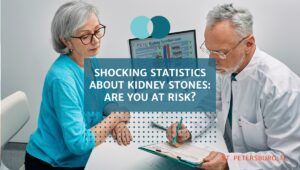Key Takeaways:
- One in ten people will develop kidney stones in their lifetime, with 500,000 people in the US seeking emergency treatment for them each year.
- Risk factors for kidney stones include age, gender, race, and geographic location, as well as lifestyle factors such as obesity, high blood pressure, and stress. Diet is also a major factor.
- Prevention methods include a balanced diet with adequate hydration, limiting animal protein and salt, and natural remedies such as apple cider vinegar, pomegranate juice, and certain herbs.


Statistics About Kidney Stones
In simple terms, a kidney stone is a small, crystalline mass formed by minerals and salts that accumulate in the urine. The stone may pass harmlessly through the urinary tract, or it may lodge itself in the ureter, causing unbearable pain. The National Kidney Foundation estimates that one in ten people will develop a kidney stone in their lifetime, with a whopping 500,000 people in the U.S. seeking emergency treatment for kidney stones each year.
The prevalence of kidney stones varies significantly among different demographics. It’s a numbers game based on factors such as age, gender, race, and geographic location. Men between the ages of 30 and 50 are the most likely to develop kidney stones, with a prevalence rate of 19%. Women, on the other hand, face only a 9% risk. White Americans are more susceptible based on race, and those living in the Southeastern United States—also known as the “Stone Belt”—are most likely to be affected.
Causes
Understanding the common causes of kidney stones is critical to reducing your risk. Kidney stones can result from lifestyle factors such as obesity, high blood pressure, and stress. But perhaps the most significant factor is diet. Diets high in animal protein, sugar, and salt all lead to a higher incidence of kidney stones. Conversely, a diet that includes adequate hydration, limits animal protein, and reduces sodium intake can greatly reduce your risk of developing kidney stones.
Treatments
When it comes to treating kidney stones, the most common approaches include medication, dietary changes, and in more severe cases, surgical intervention. The effectiveness of each treatment method will depend on the size and composition of the kidney stone, and the underlying cause. For smaller stones, simple medication and hydration can help the stone pass through the system with minimal discomfort. For larger stones, however, surgical intervention such as extracorporeal shock wave lithotripsy (ESWL) or ureteroscopy may be necessary.
Prevention
Preventing kidney stones is far easier than treating them—and luckily, there are numerous ways to do just that. A well-balanced diet that prioritizes hydration, fiber, and magnesium can reduce the likelihood of developing kidney stones. Similarly, natural remedies such as apple cider vinegar, pomegranate juice, and certain herbs like basil and parsley can help flush out accumulated toxins and promote kidney health.
Conclusion
In conclusion, the statistics on kidney stones are indeed shocking, with one in ten people suffering from this painful condition at some point in their lives. However, understanding the demographic factors associated with kidney stones is the first step. Next, adopting a kidney-friendly diet can be beneficial. Lastly, exploring natural remedies offers another way to help protect yourself from this misery.
If you suspect that you’re at risk for kidney stones or are experiencing symptoms, St Pete Urology is a trusted urology practice in St Petersburg, Florida, that specializes in the prevention, diagnosis, and treatment of kidney stones. Their experienced team of specialists will work with you to develop a personalized treatment plan that addresses your specific needs and concerns. Don’t let kidney stones control your life—visit St Pete Urology today for expert care and support.
References:
- “Demographic and geographic variability of kidney stones in the.” https://www.kidney.org/atoz/content/kidneystones.
- “What Causes Kidney Stones? 12 Possible Causes – WebMD.” 2 Sep. 2022, https://www.webmd.com/kidney-stones/kidney-stone-causes.
- “Kidney Stones: Symptoms, Diagnosis & Treatment.” https://www.urologyhealth.org/urology-a-z/k/kidney-stones.
- “Extracorporeal Shock Wave Lithotripsy (ESWL).” https://www.hopkinsmedicine.org/health/conditions-and-diseases/kidney-stones/extracorporeal-shock-wave-lithotripsy-eswl.




